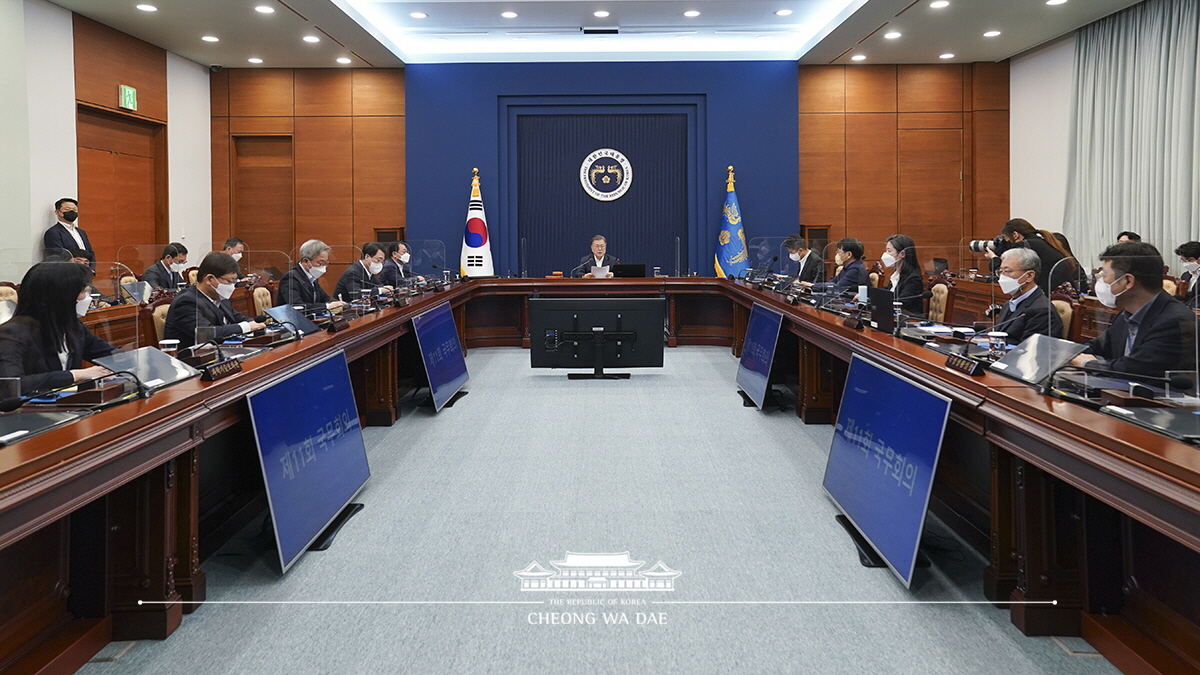이 웹사이트는 제19대 대통령 임기 종료에 따라 대통령기록관이 「대통령기록물 관리에 관한 법률」에 의해 이관받아 서비스하는 대통령기록물입니다. 자료의 열람만 가능하며 수정 · 추가 · 삭제는 불가능합니다.
다만, 「개인정보보호법」에 의하여 개인의 정보를 보호받기 원하시는 분은 관련 내용(요청자, 요청내용, 연락처, 글위치)을 대통령 웹기록물 담당자(044-211-2253)에게 요청해 주시면 신속히 검토하여 조치해 드리겠습니다. 감사합니다.
SPEECHES & REMARKS
BRIEFINGS

Let me begin the 11th Cabinet Meeting.
Tomorrow is Korea’s 20th presidential election day. This will be the time for the people to select the President who will administer state affairs for the next five years. I ask everyone to vote with the mindset of choosing the destiny and future of our country and people.
Early voting has already recorded a high voter turnout close to 37 percent. That’s up more than 10 percentage points from previous general and presidential elections, which is very desirable. I hope our citizens will demonstrate their collective intelligence by actively participating in tomorrow’s election as well.
Due to the Omicron wave, a much higher number of people who’ve tested positive is expected to take part in the election tomorrow than in early voting. It is also the first time ever to extend voting hours so those infected can go to the polls separately in their allotted time frame. I urge the National Election Commission to do everything possible to keep the process of casting and counting ballots going without the slightest glitch until all of the votes are tallied.
In particular, based on what we learned from problems revealed during the early voting period, the Commission should take extra care to guarantee the voting rights of those infected by preparing for all possibilities. If it takes a lot of time for COVID-19 patients to cast ballots or if they have to wait many hours to do so, there is a chance that they may be suffering and their symptoms could grow worse. Special attention should be paid to ensure that voting can proceed seamlessly.
Massive wildfires have recently broken out in Uljin, Samcheok, Gangneung, Donghae and other areas, wreaking tremendous havoc. However, it is very fortunate that not one human casualty has been reported. Key facilities have also been well protected. This is where we have made advancement in wildfire and other disaster responses.
I compliment the hard work of public officials from related organizations such as forest and firefighting authorities as well as others involved who have made every effort to bring the wildfires under control. I ask you to do all you can until those fires are completely extinguished.
Above all, I express my profound sympathy to the displaced victims who are deeply heartbroken after losing their homes and livelihoods overnight. This time again, many volunteers are assisting these victims, providing considerable help for overcoming the difficulties. I extend my gratitude once again.
Following Uljin and Samcheok being declared special disaster zones last weekend, Gangneung and Donghae have been added today. I urge the relevant ministries and agencies to do everything possible for swift restoration and damage relief in order to ensure that the victims return to their daily lives at the earliest date possible. The hardships of those living in the affected areas should be meticulously attended to, for instance, by even striving to help them resume farming and stabilize their lives.
The wildfires this time have instantly become mega fires due to the severest drought in 50 years and strong winds, making firefighting efforts extremely hard. As with the frequent forest fires in other countries, abnormal weather has now come to be seen as the main contributing factor in our fires. Just as new infectious diseases are occurring more frequently, large wildfires can also occur more often, which means that they can pose an increasingly serious threat. To prepare for the changing causes and patterns of forest fires, the relevant authorities should come up with fundamental countermeasures. In addition, efforts should be made to prevent forest fires, strengthen the rapid and pan-regional response systems and further upgrade equipment.
Amid the rapidly changing international order, it has become an urgent task for the Government to stably manage our economy and take the initiative in paving the way for the future. As seen in the Ukraine crisis, uncertainty in the international order is growing further, and there are rising concerns about the advent of a new Cold War era. It is difficult to predict how far the situation will escalate and how long it will last.
Meanwhile, our country is being called upon to play many more roles as its national status has risen. It is rewarding to see our national power increase to the point that we can contribute more to global undertakings and international cooperation, but at the same time, it brings corresponding burdens.
While closely engaging in international cooperation, the Government must put national interests first and respond agilely. More intensive cooperation is needed among the foreign affairs and security ministries and those related to the economy. We should also conduct diplomacy wisely. Moreover, our pan-government emergency response system must be further strengthened and thorough preparations have to be made while closely monitoring instability in supply chains, price increases and other risk factors.
It is essential that we make not only short-term responses but also efforts to proactively respond to the newly reorganized international order with a long-term perspective. We must join forces to take the lead in paving the way for the future while preemptively managing risk factors and challenges in various areas such as foreign affairs and security, the economy, energy and emerging technologies.
Regarding foreign affairs and security in the rapidly changing international order in particular, preparations should be made in advance so that we can also work well with the president-elect’s team after the election.



